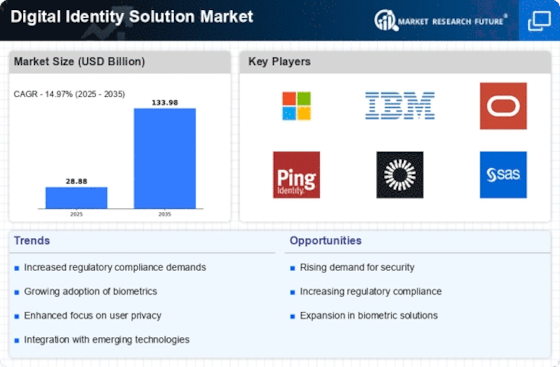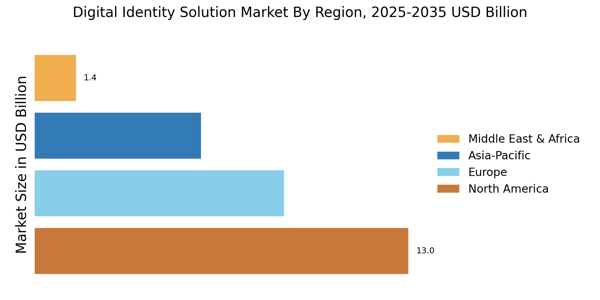Increased Cybersecurity Threats
The Digital Identity Solution Market is experiencing heightened demand due to the escalating threats posed by cybercriminals. As organizations face an increasing number of data breaches and identity theft incidents, the need for robust digital identity solutions becomes paramount. In 2025, it is estimated that the cost of cybercrime could reach trillions of dollars, prompting businesses to invest in advanced identity verification technologies. This trend indicates a shift towards more secure authentication methods, such as biometrics and multi-factor authentication, which are becoming essential components of digital identity solutions. Consequently, the industry is likely to witness significant growth as companies prioritize cybersecurity measures to protect sensitive information and maintain customer trust.
Emergence of Blockchain Technology
The Digital Identity Solution Market is witnessing a transformative shift with the emergence of blockchain technology. This decentralized approach to identity management offers enhanced security and transparency, addressing many challenges associated with traditional identity verification methods. By leveraging blockchain, organizations can create tamper-proof digital identities that empower users with greater control over their personal information. In 2025, it is anticipated that the adoption of blockchain-based identity solutions will increase, particularly in sectors such as finance and supply chain management. This trend suggests a growing recognition of the potential of blockchain to revolutionize the digital identity landscape, driving innovation and investment in the market.
Growing Adoption of Digital Services
The Digital Identity Solution Market is significantly influenced by the rapid adoption of digital services across various sectors. As businesses increasingly transition to online platforms, the necessity for secure and efficient identity verification processes becomes critical. In 2025, it is projected that the number of digital transactions will surpass billions, necessitating reliable digital identity solutions to facilitate seamless user experiences. This trend is particularly evident in sectors such as finance, healthcare, and e-commerce, where secure identity management is essential for compliance and customer satisfaction. The growing reliance on digital services is likely to drive innovation and investment in the digital identity sector, further propelling market growth.
Regulatory Pressures and Compliance Requirements
The Digital Identity Solution Market is shaped by stringent regulatory frameworks aimed at protecting consumer data and privacy. Governments worldwide are implementing regulations that mandate organizations to adopt secure identity verification processes. For instance, the General Data Protection Regulation (GDPR) and the California Consumer Privacy Act (CCPA) have set high standards for data protection, compelling businesses to invest in digital identity solutions that ensure compliance. As regulatory scrutiny intensifies, organizations are increasingly recognizing the importance of integrating robust identity management systems to mitigate risks associated with non-compliance. This trend is expected to drive the demand for digital identity solutions, as companies seek to align with evolving legal requirements.
Rising Consumer Awareness and Demand for Privacy
The Digital Identity Solution Market is increasingly influenced by rising consumer awareness regarding data privacy and security. As individuals become more informed about the risks associated with sharing personal information online, there is a growing demand for solutions that prioritize privacy. In 2025, surveys indicate that a significant percentage of consumers are likely to choose services that offer transparent data practices and robust identity protection measures. This shift in consumer behavior is prompting organizations to adopt digital identity solutions that not only enhance security but also build trust with their customers. Consequently, the market is expected to expand as businesses respond to this demand for privacy-centric identity management solutions.


















